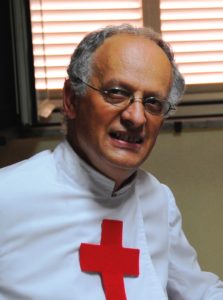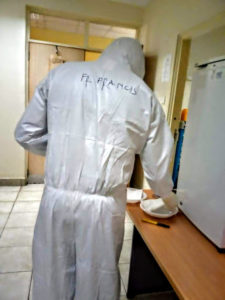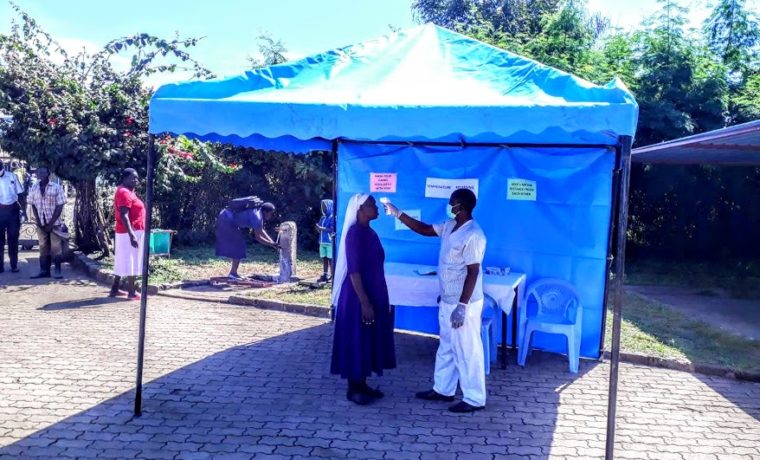 The first COVID-19 patient in Kenya was identified on March 13, 2020. It has been about a month and a half since that day, and, thank God; there has not been spread of the virus like a wildfire that many had predicted because of the social behavior of the people and the deficient health care system of Kenya. As of April 25, the official figures of the government are as follows: 340 positive cases, 15 dead, and 55 recovered. Everyone is wondering whether these figures are accurate, given the difficulty of finding the necessary laboratory equipment to carry out the test.
The first COVID-19 patient in Kenya was identified on March 13, 2020. It has been about a month and a half since that day, and, thank God; there has not been spread of the virus like a wildfire that many had predicted because of the social behavior of the people and the deficient health care system of Kenya. As of April 25, the official figures of the government are as follows: 340 positive cases, 15 dead, and 55 recovered. Everyone is wondering whether these figures are accurate, given the difficulty of finding the necessary laboratory equipment to carry out the test.
Curfew
Since March 15, the government has imposed strict hygiene regulations such as handwashing, social distancing, wearing masks, etc., to prevent the spread of the virus. The most controversial law is the curfew, which starts at 19:00 HRS and lasts until 5:00 in the morning. Anyone found outside the house risks arrest. This measure has affected many who are working at night with severe consequences for the economy. Another restriction is the closure of the capital city of Nairobi, considered as the powder keg of the epidemic. Those who are in the city cannot leave, and those outside in the suburbs cannot enter. The checkpoints impose this prescription. There is still no lock-down – confinement inside the house, but it is expected to be imposed soon. It will not be too easy to put it into practice because many people are living outside in the street where they work and earn their living. Forcing everyone to stay inside the house means preventing many from grabbing their daily bread and force them to starvation.
The Situation of the Camillians
The Camillian Delegation has no case of contagion. One Brother who just returned from Ireland is under quarantine as imposed by the government for returnees. The two hospitals of Tabaka and Karungu have no cases of Covid 19 among the patients and staff, but the fear is enormous. In Karungu hospital, a tent has been set up at the gate where all those entering the premises have to wash their hands with soap and water, and the body temperature is measured. Everyone has to wear a face mask. The problem of personnel protection in the ward remains hanging due to lack of PPE (Personal Protection Equipment) supplies such as gloves, boots, apron, headgear, and gowns.
None of our ministerial activities – hospitals, chaplaincies, dispensaries – have been closed except Dala Kiye children’s orphanage and the Blessed Luigi Tezza Elementary and Secondary School in compliance with the government decree of the closing of all schools. For this reason, our seminarians in the orientation, philosophy, and theology courses went home to their families for an indefinite period, except the novices who are continuing their novitiate formation but suspending their apostolate of visiting the hospital every morning. Instead of the apostolate, the novices recite every day the novena prayer to St. Camillus, asking his intercession as the patron saint of the sick to protect the nation from the pandemic and to keep healthy the front-liners who are working in the hospitals assisting those affected.
The chaplains who are working in five hospitals, continue to offer their ministry mainly by on call to administer the sacraments of the sick. The official celebration of Holy Mass has been banned as per government directives and endorsed by the Episcopal Conference of Kenya, from all public places. Just like in the Western countries, the faithful are following the liturgical celebrations  online. The monthly retreat of the novices and the sacrament of reconciliation are suspended.
online. The monthly retreat of the novices and the sacrament of reconciliation are suspended.
Online Activities
Other official activities, such as the annual General Assembly, which usually takes place in May has been suspended while the Delegation Councils are done via video-conference. Lessons in theology are also done online. The seminarians are following the lessons from home using the “Zoom” program.
In conclusion, the eruption of the deadly virus has changed the lives of the Kenyans, including the Camillians, even if for the moment it has not upset them, and has not caused the “revolution” that has raged in China and Europe. In this, we must thank the diligence of the Kenyan government that, learning the lesson from the mistakes made by some Western nations, since the appearance of the first case of restrictive contagion measures for prevention has been imposed sometimes with excessiveness. We hope, and for this, we pray with perseverance, that the Lord will extend his merciful hand on this continent already tried, in many ways, in other aspects of daily life.
Paolo Guarise















Camillians on Facebook
Camillians on Twitter
Camillians on Instagram